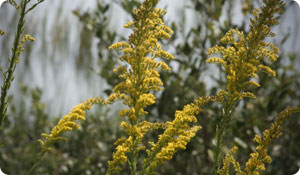
The arrival of spring may warm your spirits, but if you suffer from seasonal allergies, it can also put a damper on your well-being. With milder temperatures comes periods of turbulent weather-rain, thunderstorms, and heavy winds-which can ignite uncomfortable allergy symptoms. Here, tips on how to keep your symptoms to a minimum during spring-and every other season, too.
Is Rain a Trigger?
Sure, rain may worsen your allergy symptoms, but only in certain circumstances. Most of the time, rain is good for allergies because it helps wash away pollen and mold spores. However, for those who are sensitive to rye grass pollen, rain may actually heighten symptoms. This is because raindrops break up the larger pollen grains and then release the tiny particles into the air. These particles are tiny enough to enter the nose and lungs, thereby setting off the immune system.
The Thunderstorm Connection
The onset of allergies can begin before a thunderstorm even begins. In the earliest stage of the turbulence, updrafts of air can increase the number of mold spores in the air.
Additionally, wind with or without rain can certainly worsen allergies as well. The gusts lift up grass pollen grains and cause them to spread into tiny particles that can set off nasal and respiratory symptoms.
Prevention Matters
Since you can't change the weather or bypass the volatile spring season, the best way to manage your allergy symptoms is to minimize your exposure to triggers. Pay attention to the weather forecast and follow the daily pollen and mold counts, which you can typically find in your local newspaper and radio stations, as well as on the website of the American Academy of Allergies, Asthma and Immunology (AAAAI). Try to stay indoors as much as you can during periods of high allergen counts and inclement weather.
If you must go outside when your seasonal triggers are prevalent, be sure to take a hot shower afterwards and wash your clothes to remove pollen grains that cling to your hair and body. If you have any pets, you should also bathe them often in the spring, since their fur can trap a host of allergens that get stirred up in the air.
Treating the Symptoms
It's also important to follow a strategic allergy treatment plan. You can talk to your allergist about the best allergy control medications to take for your specific situation. If your seasonal allergies don't respond to over-the-counter or prescription medicines, it may be time to consider immunization therapy to help desensitize you to your triggers.
Sources:
"Allergy and Asthma Advocate: How Pollen Counts Affect Allergies and Asthma." American Academy of Allergy, Asthma and Immunology. AAAAI, Spring 2007. Web, 28 Feb. 2011.
"Allergy & Asthma Issues: Look Forward to Spring with Immunotherapy." American Academy of Allergy, Asthma and Immunology. AAAAI, Spring 2009. Web, 28 Feb. 2011.
Grundstein, A. "Thunderstorm Associated Asthma in Atlanta, Georgia." Thorax, Vol. 63, Issue 7. 2008: 659-660.
"Media Resources: Pollen Q & A." American Academy of Allergy, Asthma and Immunology. AAAAI, n.d. . Web, 28 Feb. 2011.
"Spring Allergies and Asthma: Pollen Counts." American Academy of Allergy, Asthma and Immunology. AAAAI, 8 March 2004. Web, 28 Feb. 2011.





